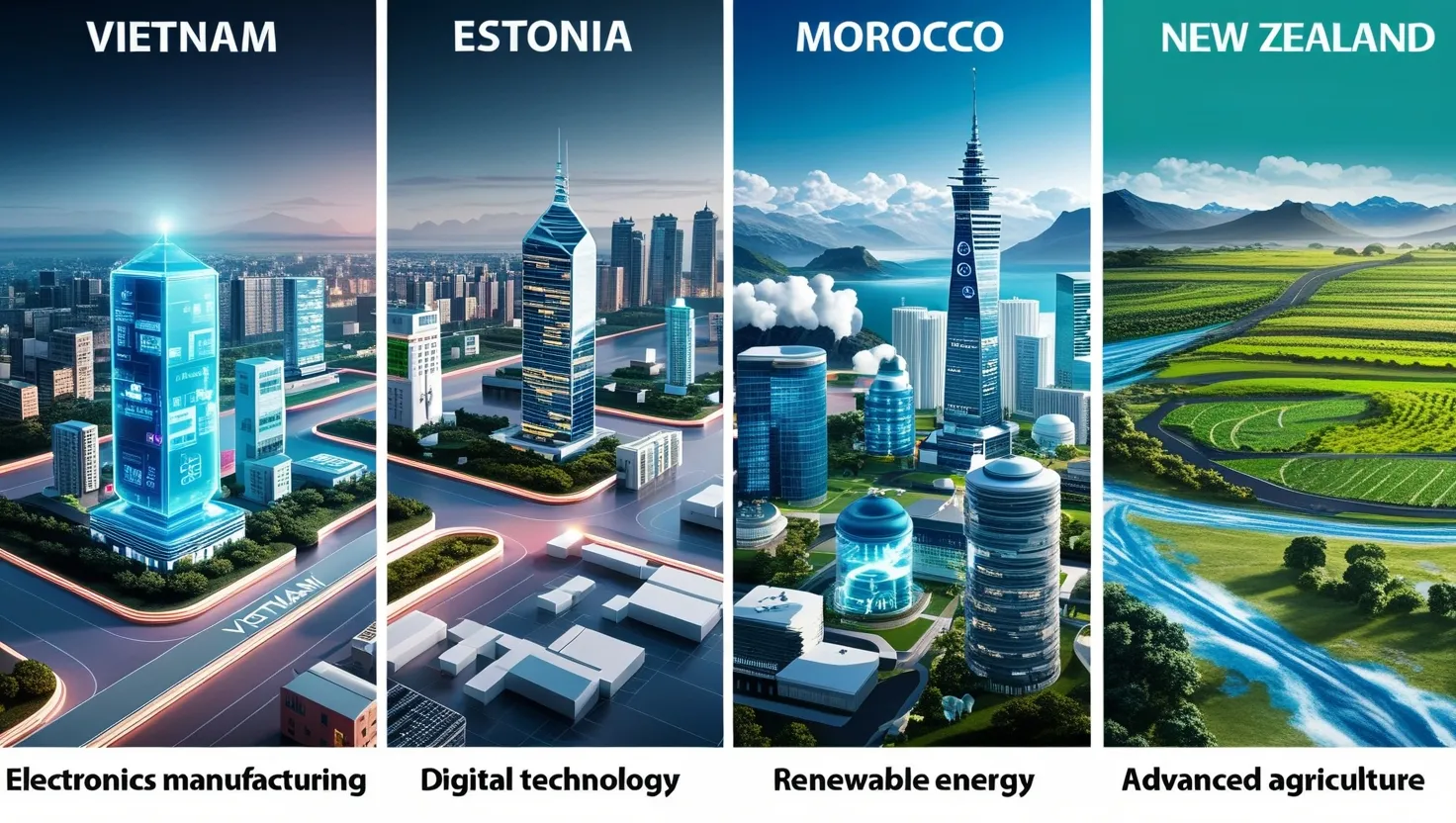As we step into 2024, the global economic landscape is witnessing the rise of several silent powerhouses that are making significant waves, often under the radar of mainstream attention. These countries are leveraging unique strengths, innovative policies, and strategic positioning to carve out their niches in the global economy. Let’s delve into the stories of Vietnam, Estonia, Morocco, and New Zealand, each of which is forging its own path to economic prominence.
Vietnam’s Electronics Manufacturing Boom
Vietnam has been quietly transforming into a major electronics manufacturing hub, a shift that is reshaping the country’s economic trajectory. The presence of giants like Samsung, Apple, and Intel has been a catalyst for this growth. Samsung, for instance, has shifted its entire phone production line to Vietnam and India, with Vietnam now producing approximately 60% of Samsung’s global smartphone output.
“As we look to the future, it is clear that Vietnam will play an increasingly important role in our global strategy,” a statement that resonates with the vision of many multinational corporations investing in Vietnam.
But what makes Vietnam so attractive? The answer lies in its favorable business environment, supported by trade liberalization, corporate tax cuts, and improved labor quality. These factors have created a perfect storm that is drawing in foreign investors and turning Vietnam into a global manufacturing powerhouse.
However, Vietnam’s electronics industry still faces challenges, particularly in terms of localization. Despite the significant foreign investment, the sector remains heavily dependent on imported components. To address this, the Vietnamese government is actively involved in international cooperation programs and supporting local businesses to enhance their technological capabilities and competitiveness.
Estonia’s Digital Economy and E-Residency Program
On the other side of the globe, Estonia is making headlines with its robust digital economy and innovative e-residency program. This tiny Baltic nation has become a beacon for digital innovation, attracting entrepreneurs and businesses from around the world.
“Estonia is a country that is very open to new ideas and very willing to experiment,” says Toomas Hendrik Ilves, the former President of Estonia, highlighting the country’s forward-thinking approach.
Estonia’s e-residency program allows non-citizens to register and manage a business in Estonia, regardless of their physical location. This has opened up a world of opportunities for startups and remote workers, making Estonia a hub for digital entrepreneurship.
The government’s commitment to digital infrastructure and cybersecurity has also been a key driver of this growth. Estonia’s digital society is built on a foundation of e-government services, digital health records, and online voting systems, making it one of the most digitally advanced countries in the world.
Morocco’s Renewable Energy Sector Growth
In North Africa, Morocco is emerging as a leader in the renewable energy sector. The country has set ambitious targets to generate 52% of its electricity from renewable sources by 2030, and it is well on its way to achieving this goal.
“Renewable energy is the future, and Morocco is at the forefront of this transition,” notes a senior official from Morocco’s Ministry of Energy.
Morocco’s strategic location at the crossroads of Europe, Africa, and the Middle East makes it an ideal place for harnessing solar and wind energy. The country’s flagship project, the Noor-Ouarzazate solar complex, is one of the largest solar farms in the world and a testament to Morocco’s commitment to renewable energy.
Government policies have been instrumental in driving this growth. Morocco has implemented a range of incentives, including tax breaks and subsidies, to encourage investment in the renewable energy sector. This has attracted major players like Siemens and Enel Green Power to invest in Moroccan renewable energy projects.
New Zealand’s Agritech Innovations
In the Southern Hemisphere, New Zealand is revolutionizing the agricultural sector with its cutting-edge agritech innovations. Known for its pristine landscapes and high-quality agricultural products, New Zealand is now leveraging technology to enhance its agricultural output and sustainability.
“Agriculture is not just about farming; it’s about using technology to make farming smarter and more sustainable,” says a New Zealand agritech entrepreneur.
New Zealand’s agritech sector is focused on developing solutions that improve crop yields, reduce waste, and enhance the overall efficiency of farming practices. Companies like FarmIQ and Agritech are at the forefront of this innovation, using data analytics, drones, and precision farming techniques to transform the agricultural landscape.
The government has also been supportive, with initiatives like the Agritech New Zealand organization providing a platform for startups and established companies to collaborate and innovate. This has created a vibrant ecosystem that is attracting global attention and investment.
Global Market Impact and Challenges
As these countries continue to grow, they are having a significant impact on the global market. Vietnam’s electronics manufacturing is influencing the global supply chain, while Estonia’s digital economy is setting new standards for e-governance and digital entrepreneurship. Morocco’s renewable energy sector is contributing to global efforts to combat climate change, and New Zealand’s agritech innovations are improving agricultural practices worldwide.
However, each of these countries also faces unique challenges. Vietnam needs to address its dependency on foreign components and enhance the competitiveness of its local businesses. Estonia must continue to innovate and stay ahead of the curve in the rapidly evolving digital landscape. Morocco has to balance its renewable energy ambitions with the need for economic stability and job creation. New Zealand must ensure that its agritech innovations are accessible and beneficial to all farmers, not just the large-scale ones.
Long-Term Sustainability
The long-term sustainability of these economic models is crucial. Vietnam’s electronics industry, for example, needs to focus on sustainable practices and environmental responsibility as it grows. Estonia’s digital economy must ensure that it remains inclusive and accessible to all citizens, not just the tech-savvy.
Morocco’s renewable energy sector has to navigate the complexities of energy policy and ensure that its transition to renewables is smooth and equitable. New Zealand’s agritech sector needs to balance innovation with the need for environmental sustainability and social responsibility.
As we look to the future, it is clear that these silent economic powerhouses are here to stay. They are not just punching above their weight; they are redefining the rules of the global economy. Whether it is through electronics manufacturing, digital innovation, renewable energy, or agritech, these countries are showing us that with the right combination of policy, innovation, and determination, even the smallest nations can make a big impact.
“Success is not final, failure is not fatal: It is the courage to continue that counts,” as Winston Churchill once said. These countries are embodying this spirit, and their stories serve as a reminder that in the ever-changing global economy, courage, innovation, and determination can lead to remarkable achievements.






